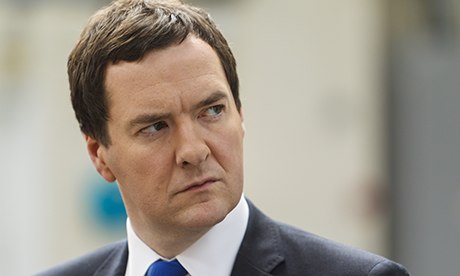These simple steps would provide the direction for deeper reform of the banking system

Public pressure for better banking reform from George Osborne, the chancellor, is growing. Photograph: Chris Ison/PA
Some six years after the banking crash, the UK taxpayer is still providing £977bn of loans and guarantees (pdf) to support the ailing banking sector. The reform process is painfully slow. The banking reform bill currently going through parliament (pdf) has grown from 35 pages to 170 pages, but still does not deal with the flaws that led to the crisis. Public pressure for a tougher approach is growing, with figures including the archbishop of Canterbury demanding firmer government action. The chancellor, George Osborne, should at the very least do the following five things. On their own, they won't necessarily solve the deep-seated crisis in our financial institutions, but they would provide the direction for deeper reforms.
1. Think outside the ringfence
Introduce a statutory separation of retail banking from speculative banking and not just the weak "ringfence" he is proposing. Despite the crash, banks remain addicted to gambling with other people's money. They bet on everything from the movement of interest rates, price of commodities, oil, wheat, foreign exchange and much else through complex financial instruments known as derivatives. Derivatives have been described by investment guru Warren Buffett as "financial weapons of mass destruction". Derivatives brought down Lehman Brothers, Northern Rock, Bear Stearns, MF Global, Countrywide, Merrill Lynch, Wachovia and Washington Mutual, just to mention a few. Yet no lessons have been learned.
The Bank of International Settlements (BIS) shows that the notional/face value of over-the-counter (OTC) derivatives is about $693tn. In addition, derivatives are traded on exchanges; adding up to a whopping $1,200tn. The exact economic exposure of the UK banking system is probably considerably lower, but is not known. The Treasury's response to requests for information is that the information "is not currently available". So what do bank balance sheets show us? The financial statements of Barclays Bank (pdf) show the dangers. Its derivatives assets and liabilities of £469bn and £462bn respectively need not net off and could expose it to anything from £7bn to over £900bn. The UK, with a GDP of £1.5tn is in no position to absorb the losses and the knock-on effects. Even Nobel prize winners in economics have been unable to manage the risks in derivatives.
2. Hold banks responsible for losses
Withdraw limited liability from speculative banking. Merely separating the banking arms is not enough because banks use monies from savers, pension funds and insurance companies to finance their gambling habit. Major losses from their bets will ultimately infect the rest of the economy and affect every household. Therefore, the owners of these vast casinos must be held personally liable for the losses.
3. Make them balance the books
Force banks to address their gross undercapitalisation. Barclays has gross assets of £1,500bn against capital of just £63bn. A decline of just 4.22% in the value of its assets could wipe out its entire capital. HSBC has gross assets of $2,700bn (£1,687bn) compared to capital of $183bn (£114bn). It can barely absorb the decline of 6.75% in its asset value. Capital ratios in these ranges have not been and will not be good enough to cushion losses. No doubt some will say that some assets are less risky than others and banks will get away with modest capital ratios, but none of this saved banks previously. So a healthy capital adequacy ratio of at least 12.5%, and higher, should be aimed for.
4. End fat-cattery
Risk capital should be built by clamping down on executive pay. No executive should receive more than 10 times the minimum wage until the required capital levels are reached.
Despite the taxpayer-funded bailouts excessive executive pay is rife and remains linked to reckless risk-taking. The long-term solution is to empower bank employees, savers and borrowers to vote on executive remuneration. They all have a long-term interest in the wellbeing of banks and can curb reckless risk taking.
5. Crack down on the auditors
Bring in a fundamental overhaul of the auditing of banks. Big accounting firms, acting as auditors of banks, are supposed to be the eyes and ears of financial regulators, but the lure of profit is too strong. Almost every ailing bank received a clean bill of health (pdf)from its auditors who received millions of pounds in auditing and consultancy fees. In some cases, banks collapsed within days of receiving the all-clear. Even worse, in some cases auditors were complicit in dubious practices. It is time to remove the accounting firms from audits in the financial sector. That task should be performed by a specially created body, equivalent to the National Audit Office. Unlike the present situation, the financial regulator should have unhindered access to all data held by the auditors.
